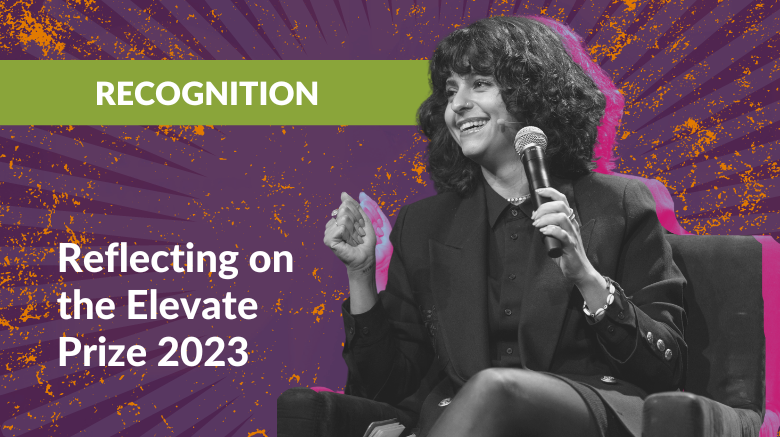We couldn’t be prouder of our CEO, Sana Ali Mustafa, as a winner of The Elevate Prize. The Prize recognizes a select number of trailblazing nonprofit leaders, providing them with tailored resources to go even further in their leadership and unrestricted funding for the nonprofit they lead (in Sana’s case, us!). We asked Sana what this prize means to her as an activist and a leader in the refugee response sector, and she shared her thoughts with us. Here is what she said:
What does it mean to you personally to win this Prize?
As a person constantly trying to shape and change the unjust realities around me that affect my life and the lives of millions in our world, I feel extremely grateful to be seen, supported, and recognized by such a remarkable community, The Elevate Prize Foundation. My teams at Asylum Access and I are humbled by this support and eager to continue to change and challenge power structures and systems that deprive forcibly displaced persons of their rights and power.
My role as CEO at Asylum Access has been transformative for me personally and our organization. In the past couple of months, I have had many opportunities to lead the change that I want to see in the refugee response sector. The Elevate Prize recognizes the power of refugee-led organizations and refugee leadership in this field.
How does this prize help to shift the power?
At Asylum Access, we believe institutions led by those most affected and those most proximate are undertaking foundational and transformative work for and with their communities. However, civil society organizations, especially refugee-led organizations (RLOs), are not recognized as equitable partners in our sector. Despite being behind the most successful solutions to refugee issues, they are excluded from international funding, which overwhelmingly goes to big international organizations that are far removed from the issues they work on and the communities they “help”
The role of forcibly displaced persons in decision-making and the ability to secure sustainable funding for locally-led organizations and trust them to be the experts on refugee issues should be the measurement for refugee inclusion.
Sana Ali Mustafa
Recognizing refugee leadership should not be limited to inviting us “occasionally” to sit on a decision table to meet an inclusion quota created by an international organization. Inclusion is more than checking a box on a piece of paper. The role of forcibly displaced persons in decision-making and the ability to secure sustainable funding for locally-led organizations and trust them to be the experts on refugee issues should be the measurement for refugee inclusion.
This understanding of true inclusion stems from my experience when invited to conferences where I was often silenced or told that I was “too pessimistic.” Additionally, our day-to-day engagements with big international NGOs have proven that the solutions designed by those INGOs where the communities with lived experience are merely passive recipients, also known as “ beneficiaries”, are shallow and temporary. Their solutions don’t target barriers that prevent dignified life and long-term well-being in a cost-effective and culturally aware manner.
For example, in May 2016 during the World Humanitarian Summit, the international community signed onto the Grand Bargain (LINK), which included specific commitments to provide greater support to local actors and the participation of affected communities in addressing humanitarian needs. Yet, the 2020 Global Humanitarian Assistance Report showed that only 0.5% of tracked funding in 2019 directly financed local and national NGOs, despite targets to allocate at least 25% of humanitarian funding to local and national responders by 2020. This demonstrates that barriers continue to persist when it comes to devising funding mechanisms and moving resources to local communities. The global north, including the United States and Europe, continue to control and exercise enormous power over funding streams.
At Asylum Access, we recognize that the tendency to preserve a hierarchy, structural racism, and bias in our sector have led to the systemic exclusion of local civil society—particularly refugee-led groups—within funding streams, as well as strategy development and decision-making processes. Therefore, we believe that we have a duty to shift the power and resources to refugee leaders and their organizations. We demand new structures that center on people who have experienced forced displacement. Winning the Elevate Prize was another step in the right direction to ensure that our movement has the resources needed to address the issues facing our community without taking the power of decision-making from us. To achieve true and meaningful participation of local communities, we need to make disruptive changes that dismantle these existing power structures. This is why we need funders like the Elevate Prize to step in and put more power and funding directly into refugee-led organizations.
We see our work as a movement, and for any movement to succeed, we need allies who believe in our ability to make decisions for our own community. It is crucial to have allies who see us as the true leaders of solutions and trust in our vision without having to stream their funding to a third-party international organization. That is what Elevate did, and we hope that more funders join this movement to shift the power to forcibly displaced communities.

